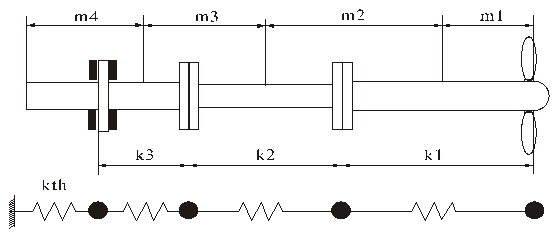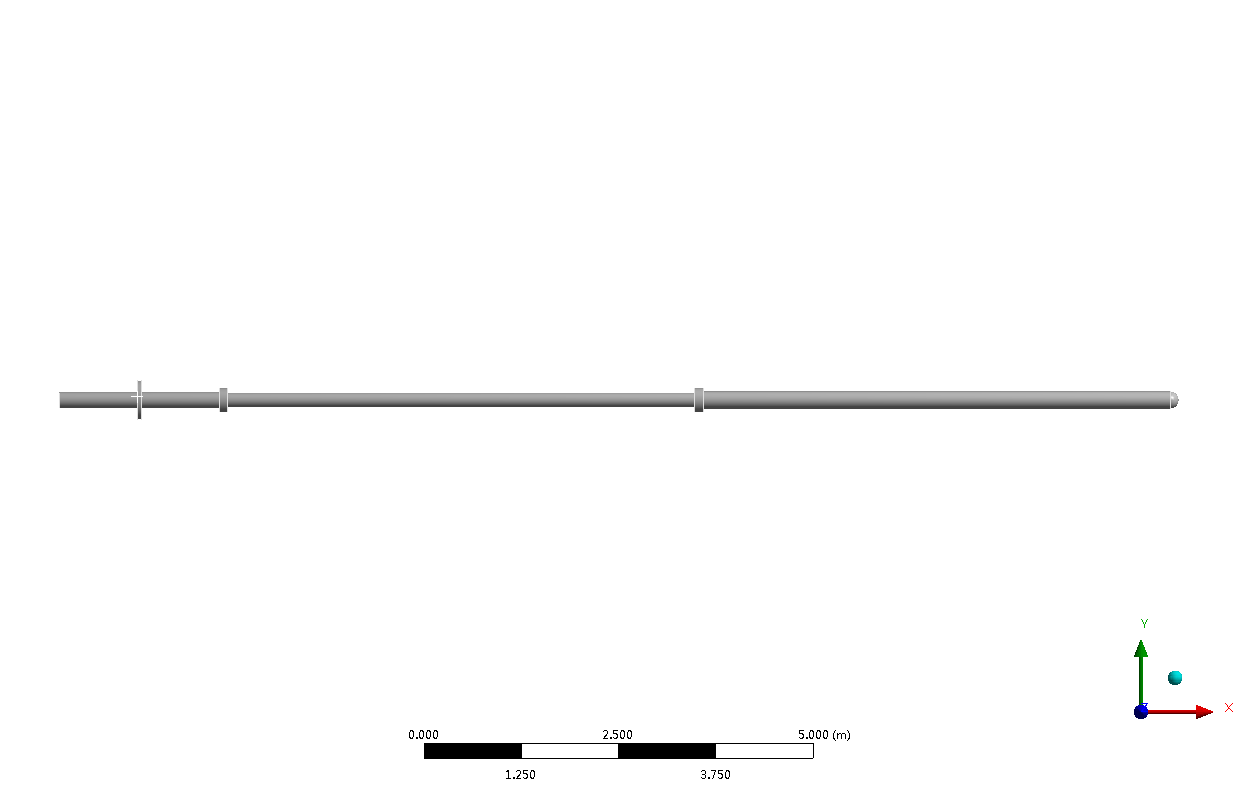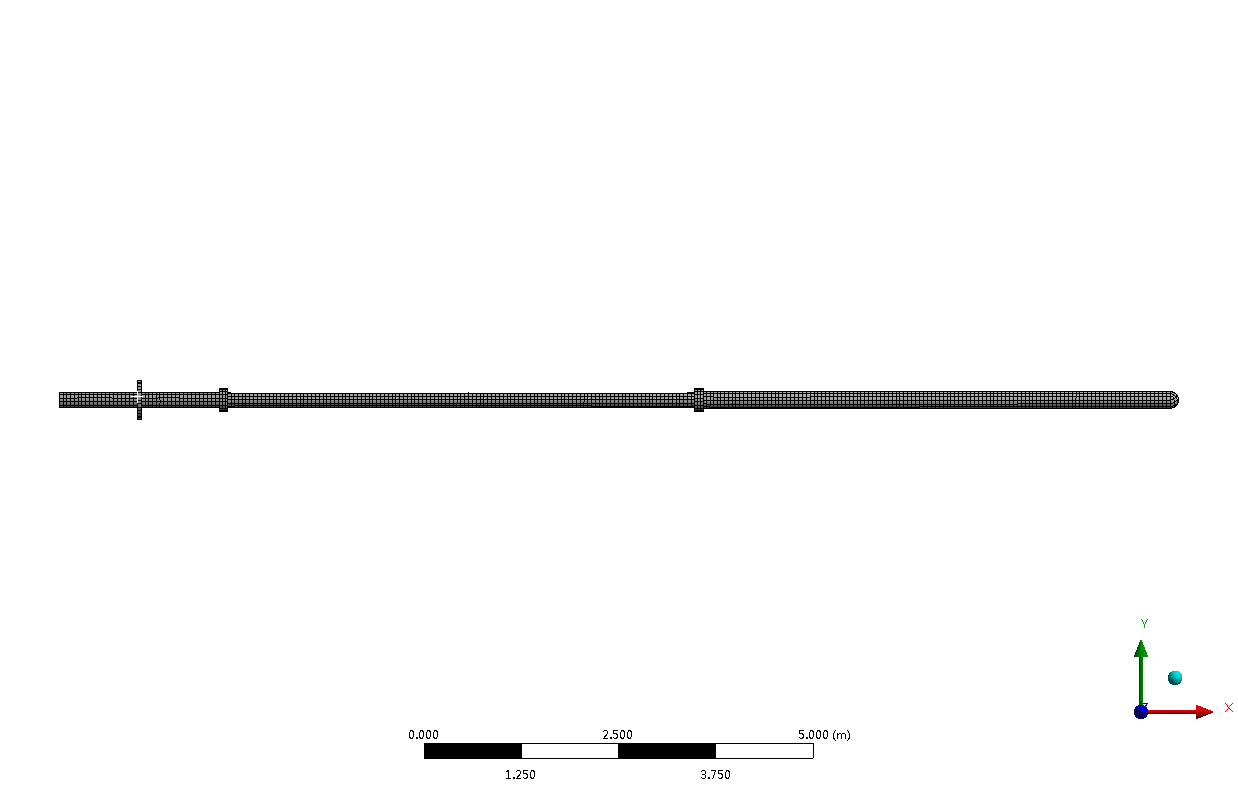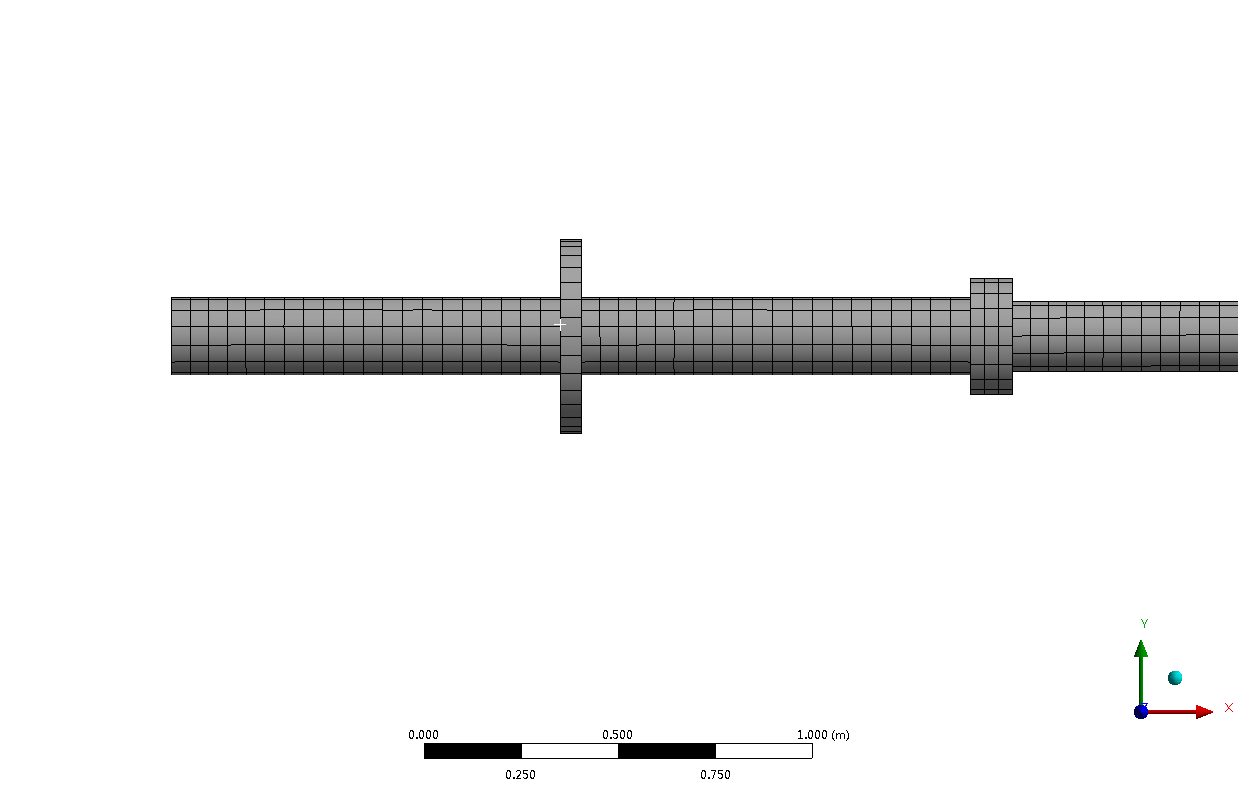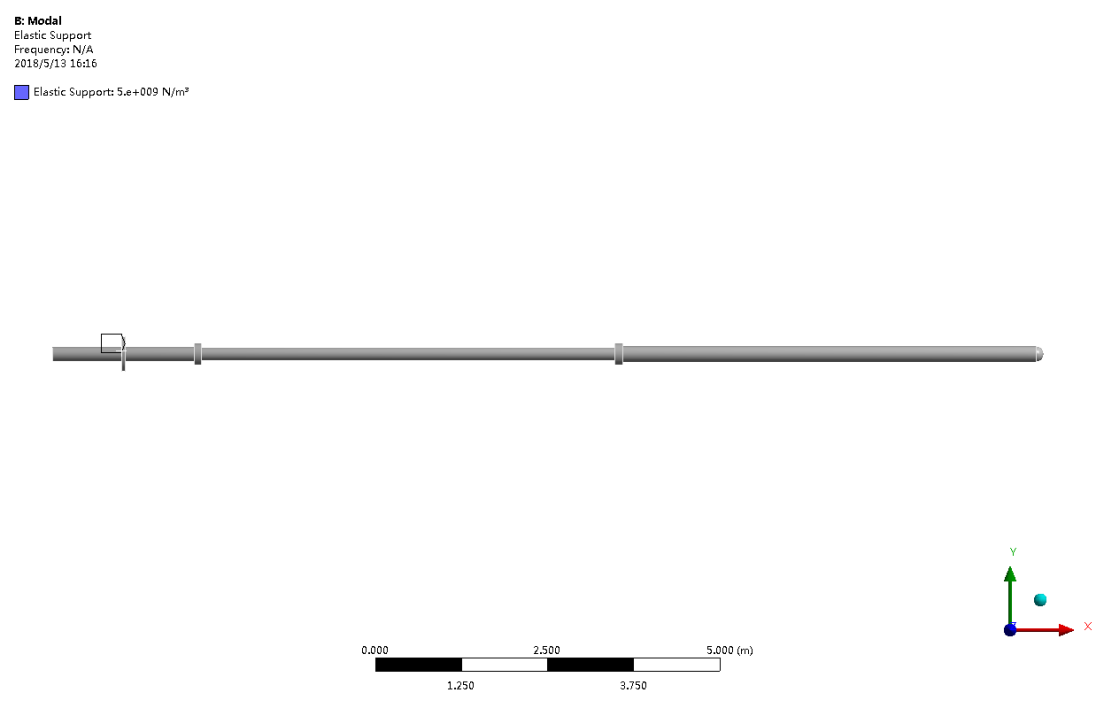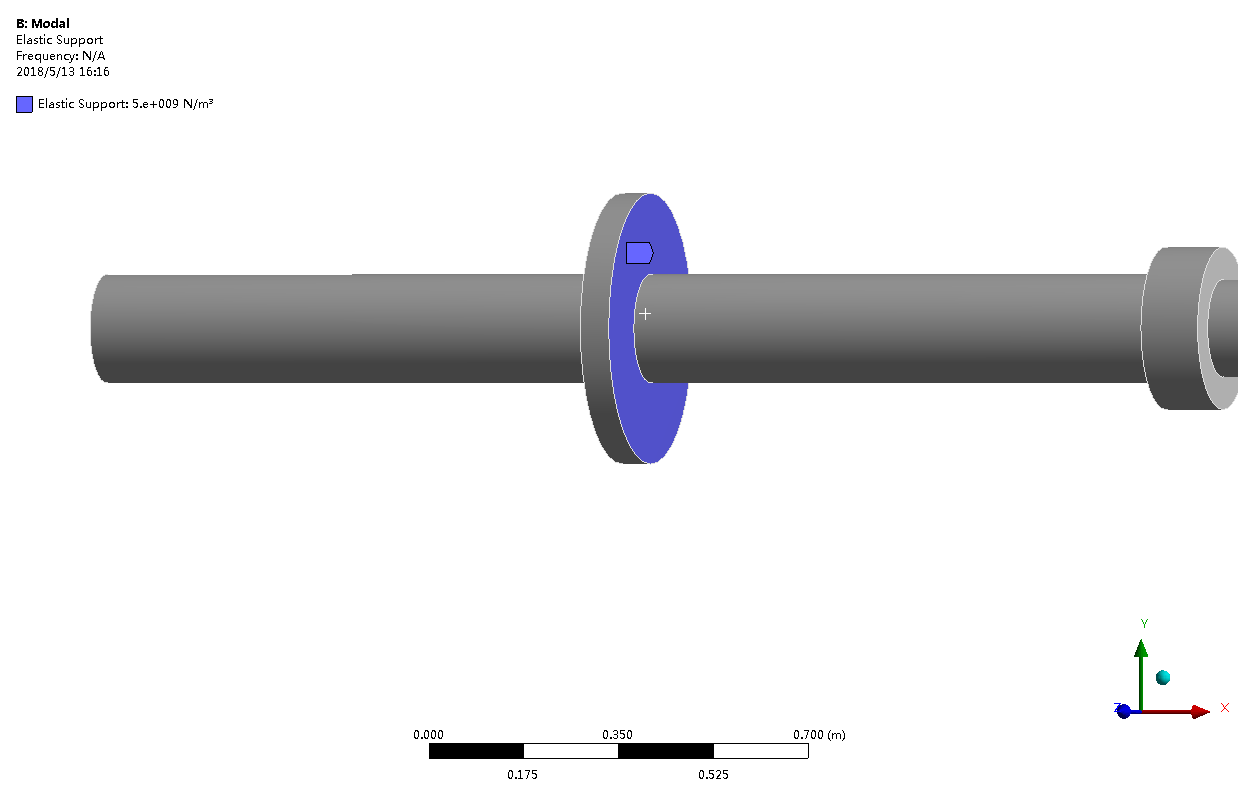集装箱船舶轴系振动特性分析及控制研究毕业论文
2020-04-05 11:04:17
摘 要
船舶前进的动力主要都是由船舶推进轴系提供的,动力的传递过程包括先由主机产生机械能传递给螺旋桨,该机械能会推动螺旋桨旋转,这时因为螺旋桨在流场中旋转会在桨叶处形成轴向推力,该轴向推力反向通过推进轴系传给船体,为船舶提供前进动力。通常当船舶在航行状况时,很多不同的载荷会船舶轴系产生一定程度的影响,从而导致船舶轴系在多种载荷的不均匀作用下产生不同程度的振动,再往更细的层面深究,轴系里承担不同作用的轴承会因为轴系整体的振动受到更多更复杂的应力,从而导致更严重的现象比如由于各种复杂力系的传递作用让整个船体产生相应的振动,因为集装箱船舶的负重较大,此类振动是船舶在海上航行时安全保障工作的一大重难点,所以针对船舶轴系振动的研究也颇受关注。有研究表明,主推进轴系振动很容易以继发性激振源的形式直接导致船体振动,不仅如此主推进轴系纵向振动还很容易引发潜艇等一些需要隐声特性的船舶在水下发出低频辐射噪声,这些对大型船舶来说都是非常不利的因素,所以无论基于对普通民用船舶的稳定性能和安全性能的考虑还是对军用船舶特别是潜艇对静声的要求,对轴系振动特性的分析和有效的控制方法的探索,都显得尤为关键。
在上述前提下,本文的主要方向设定在对大型集装箱船舶的主推进轴系进行合理的简化和建模,并介绍简单的计算方法和分析内容,以此为基础对大型集装箱船舶轴系的自由振动的固有振动频率和振型进行求解,求解所得固有频率及固有振型可以作为前提归结相应船舶轴系振动的原因和总结大型船舶纵振的规律,分析集装箱船舶在航行海况下对相应的振动频率的规避措施以完成对共振现象的规避。在无法通过人为方法避免振动的情况下,本文还将讨论附加的阻尼吸振器和无阻尼吸振器两者吸振性能的优劣。
本文的主要工作包括:
(1)对大型集装箱船舶的纵向振动自由振动的计算方法进行简单的介绍,通过三维建模软件简化实际复杂的船舶推进轴系并对简化轴系建模,用规范的六面体网格划分所建立的模型。
(2)根据实船的参数对建立的三维模型设置同样的约束,设置完约束后对该轴系模型进行模态分析求解,求解获得该实船轴系的固有振动频率和固有振动振型,以所得的各阶固有振动频率为基础,寻求海运船舶针对纵向振动的避振措施。
(3)总结当前国内外在动力吸振器方面的研究成果,分别分析现今船用主流动力吸振器的吸振原理,用假设的函数对附加阻尼吸振器和无阻尼吸振器吸振效果进行归纳,讨论实船处在不同的振动频率适用的不同类型吸振器。
关键词:船舶主推进轴系、纵向振动、固有频率与固有振型、模态分析、吸振性能比较
Abstract
The ship propulsion shafting is an important part of the ship's power plant. The main function of the propulsion shafting is reflected in the power transmitted from the main engine to the propeller, which causes the propeller to rotate. At the same time, the thrust of the propulsion shaft is transferred to the hull to promote the progress of the ship. Under actually sailing conditions, due to the influence of too many different kinds of complex loads on the propulsion shaft system, the ship's shafting system will inevitably have different degrees of vibration, and the vibration of the shaft system will not only directly affect the bearing forces of the shaft system. More seriously, for example, torsional vibration, longitudinal vibration and other types of vibration will even cause corresponding vibration in the superstructure, which will greatly affect the safety performance of the ship during navigation. Therefore, it is very important to study the vibration of the ship's shafting system. Studies have shown that the main propulsion shafting vibration is an significant secondary source of vibration that directly leads to hull vibration. For more the longitudinal vibration of the main propulsion shafting can easily cause submarines and other ships to emit low-frequency radiation noise underwater, so the main propulsion shaft is studied. Longitudinal vibration control has important and urgent practical significance both for enhancing the navigation stability of civilian vessels and for improving the submarine acoustic performance.
Through consulting relevant domestic and foreign literatures, this paper focuses on the large-scale container ship shafting,as the research object, simplifies and models the ship's propulsion shafting vibration, and introduces simple calculation methods and analysis contents. The free vibration natural vibration frequency and vibration mode of the shaft of a container ship are solved. The longitudinal vibration of the ship's shafting system is premised on the premise of the natural frequency or natural vibration mode, and the vibration law of the longitudinal vibration of the shafting system is described as far as possible. The circumvention measures of the corresponding vibration frequencies of a large container ship under sailing sea conditions are to avoid the resonance phenomenon. At the same time, the comparison of the vibration absorption performances of the additional damper absorbers and the undamped absorbers during the actual sailing process is discussed.
The main work of this paper includes:
- The calculation method for the longitudinal vibration free vibration of large container ships is briefly introduced. The complex propulsion shafting system is simplified and modeled by the 3D modeling software. After the modeling, the model is standardized with the hexahedral mesh.
- Set the real ship constraint parameters for the three-dimensional model of the main propulsion shafting system, perform modal analysis and solution of the propulsion shafting system of a real ship through the finite element analysis software ANSYS, and obtain the natural vibration frequency and natural vibration mode of the real ship shafting system. Based on the premise of the obtained natural frequency of each order, analyze the longitudinal vibration reduction measures during the navigation of the ship.
- Combining with the current domestic and foreign scholars' research on marine dynamic vibration absorbers, through the simplified structure and force analysis of today's marine dynamic vibration absorbers, the vibration absorption index of the additional damping vibration absorber and the additional undamped vibration absorber is expressed respectively. A special function corresponding to the vibration absorption index of the various types of vibration absorbers is discussed. Different types of vibration absorbers suitable for real-vessel operation at different vibration frequencies are discussed.
Keywords: Main propulsion shafting system of ship, Longitudinal vibration, Natural frequency and natural mode, Modal analysis, Vibration absorption performance comparison.
目录
第1章 绪 论 1
1.1 课题背景与研究意义 1
1.1.1 课题背景 1
1.1.2 研究意义 1
1.2 国内外研究现状 1
1.2.1 船舶推进轴系纵向振动研究 2
1.2.2 船舶轴系动力吸振器的参数研究 2
1.2.3 船舶轴系纵向振动模型的简化与计算 3
1.3 本文研究内容与研究方法 3
1.3.1 研究内容 3
1.3.2 研究方法 4
第2章 船舶轴系纵向振动模型的简化与建模 5
2.1 导言 5
2.2 船舶轴系纵向振动的简化 5
2.2.1 分布参数模型 6
2.2.2 集总参数模型 8
2.2.3 有限元模型 9
2.3 三种常见当量模型的比较 10
2.4 船舶轴系纵向振动有限元建模 11
2.4 本章小结 13
第3章 船舶轴系振动特性分析 15
3.1 导言 15
3.2 船舶轴系纵向振动Holzer计算法算法分析 15
3.3 船舶轴系模型模态分析结果 17
3.4 本章小结 23
第4章 船舶轴系振动控制研究 24
4.1 导言 24
4.2 动力吸振器吸振特性比较分析 27
4.2.1 阻尼吸振器吸振的频率特性 27
4.2.2 无阻尼吸振器的吸振频率特性 30
4.2.3 阻尼吸振器与无阻尼吸振器的吸振性能分析比较 31
4.3 本章小结 33
第5章 总结与展望 35
5.1总结 35
5.2展望 36
致 谢 38
参考文献 39
- 绪 论
1.1 课题背景与研究意义
1.1.1 课题背景
船舶轴系是船上的一个关键系统,作用是将通过螺旋桨旋转在螺旋桨桨叶处产生的轴向推力通过一系列力的传递组件输送给船体,给船舶前进提供了动力。其中,船舶轴系中所包含的组件有:螺旋桨轴、艉轴、中间轴、推力轴及其各自的轴承;联轴器;艉轴管装置。
在航运业日益繁荣的当下,大型船舶对主机功率的要求越发严格和迫切,这一定程度放大了轴系振动对船舶航行带来的影响。因为材料的缘故船舶的轴系通常被视为具有连续性的弹性体,由于螺旋桨在船体艉部流场中旋转,很多不均匀的轴向推力会在桨叶上产生,从而通过轴系将不均与的轴向力传递给主机装置,轴向力的不均匀与推进轴系相应地产生不均匀但近似周期的拉压变形,这就是船舶上纵向振动带来的危害。推进轴系纵向振动可能会并发引起主机装置、传动装置和轴系等其他系统的故障,如对主机装置可能会使主机曲轴发生弯曲疲劳破坏,对轴系系统可能导致推力轴承不紧以及对传动装置而言引起传动齿轮的较为严重的磨损等。推进轴系纵向振动带来更为严重的结果是造成全船建筑的振动和梁的垂直振动,在很多实船测试中,全船建筑振动和船用梁垂直振动都被证实是由推进轴系的纵向振动引起。而造成纵向振动的激振力源,可以追溯到在齿轮传动过程中的倾斜的传动力矩、在安装过程中的安装误差、在加工过程中的加工精度等因素。
1.1.2 研究意义
通过对当今船舶纵振现象危害的阐述,必须意识到大型集装箱船舶纵振特性分析归因和针对原因相应的控制措施的重要性,在无法避免振动时通过对船舶轴系振动特性的分析归因选取船在不同情景不同海况下所需的吸振装置以保证船在航运过程中平稳的航行也是重要课题。针对这项课题国内外都提出采用以质量体、合适阻尼和弹簧构成的附加振动系统作为动力吸振器进行船舶轴系振动控制研究。动力吸振器有简单的构造和原理,安装在曲轴端时有很好的减振效果,可以有效地对船舶推进轴系纵向振动进行控制。通过动力吸振器减振的具体措施一般是在推进轴系的某处上添加一个附加结构,由对附加结构的各项参数所做的研究分析做出更好的控制方案,可以有效对轴系在特定频率范围内上的振动响应进行控制。
1.2 国内外研究现状
1.2.1 船舶推进轴系纵向振动研究
使用螺旋桨作为推进器的船舶,其艉部一直有不稳定的伴流场存在,从而对螺旋桨产生不定常的激励力。由于作用对象的不同,螺旋桨处的激励力又分为了表面力和轴承力,表面力主要作用在船体的尾部,轴承力则主要通过推进轴系传递至船体,根据定义可以轻易发现对船体振动而言轴承力的影响更大,其对船舶振动的贡献量在70%~90%[11]。如果对轴承力细分,轴承力又可以被分解成两个不同方向的力,分别为轴向交变推力和轴向经推力其中,轴向交变推力会激励船体推进轴系产生纵向振动,这是在研究时需要特别注意的作用力[1],轴向静推力给船舶航行提供前进动力。
因为在推进轴系中纵向振动的原理和扭转振动的原理十分相似,学者经常从扭转振动的计算中获取纵向振动的计算经验,原因在于当计算推进轴系纵向振动与扭转振动的振动特性时,不管是采用相对离散的模型例如集总参数模型还是采用相对分布的模型例如分布参数模型,其模型的相似度都非常高。于是通过借用扭转振动中的动力学参数如角频率、角速度、角加速度等,将它们转化为纵向振动中的动力学位移参数如频率、速度、加速度等,如此在扭转计算中的计算公式相应的也可以用于纵振振动计算的求解。尽管很多实船已经据此运用了一些对轴系自由振动和纵向振动的计算,很多研究的样本并不能有非常完善的数据和结果的总结,纵向振动的研究仍然达不到扭转振动研究的高度[2]。
在如今对轴系纵向振动的方法中,用有限元软件建立推进轴系模型,在模型的设置中输入实船相关数据并对模型做好网格划分,是被普遍认为能最简单求解轴系自由振动及受迫振动响应的办法。有限元分析法在三维建模过程后,可以用图形显示计算结果,这一点使得轴系振动研究时有限元分析法相较其它方法具有得天独厚的优势。
1.2.2 船舶轴系动力吸振器的参数研究
在船舶振动无法避免发生的时候,拥有简便构造和良好吸振效果的动力吸振器无疑是最先被考虑使用的对象。在动力吸振器使用的措施中,通常相当于在推进轴系结构以外添加子结构,由子结构的参数的研究、设计和优化过程轴系不同频段上的响应也会发生变化[3]。
学者Goodwin很多年前就开始针对研究Resonance Chager 是否可以用于掌控由螺旋桨上的轴承力所带来的激励作用[4]。澳大利亚学者Dylejko将共振吸振器装配在轴系系统中的主机基座和推力轴承之间,重点研究了共振吸振器安装前后噪声的对比[5]。杨志荣等直接对轴系附加动力吸振器的系统建立了一个混合的模型,通过对该模型纵振固有频率的模态进行截取和综合,研究由螺旋桨处的轴承力的激励在主机基座处的放大效果,也探讨了动力吸振器具体参数的设计方案[6]。韩保红等把推进轴系简化为一维梁,以梁所能达到的最大动能表示轴系在纵振中的位移,分析在简谐激励情况下附加的阻尼吸振器和无阻尼吸振器的质量、位置等改变对梁的最大动能带来的影响[7]。于尧治、赵帅等则分别研究有阻尼主系统的动力吸振器和基于动力减振器的中空轴系单模态及多模态纵向减振[8-9]。李俊则重点计算了安装了耦合非线性碟簧动力吸振器后轴系的响应,在建模阶段采用有限元法,在计算阶段采用数值积分法和相关的动力缩减方法,主要讨论了在非线性碟簧吸振器中的主要参数如线性刚度、Coulomb阻尼和弹簧阻尼系数等对振动的抑制有何作用[10]。
1.2.3 船舶轴系纵向振动模型的简化与计算
以上是毕业论文大纲或资料介绍,该课题完整毕业论文、开题报告、任务书、程序设计、图纸设计等资料请添加微信获取,微信号:bysjorg。
相关图片展示:
